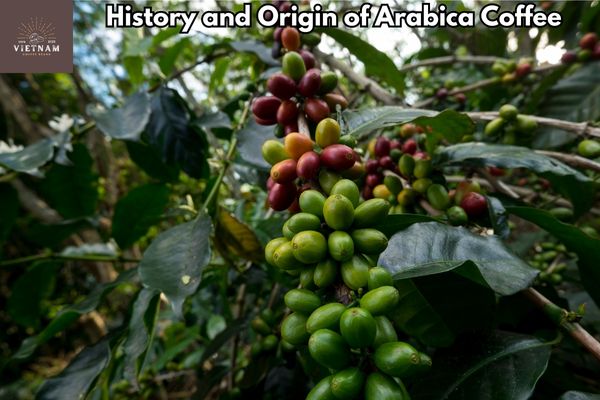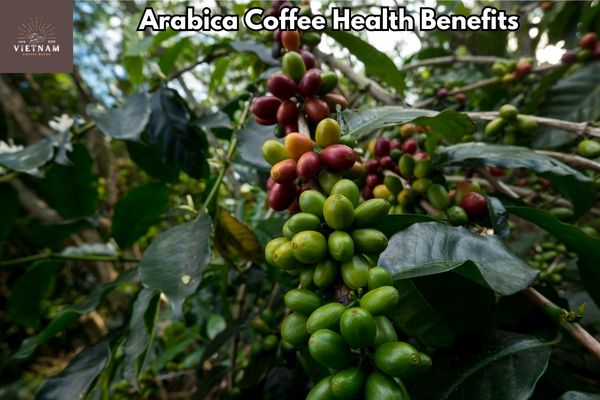I’m sure you’ve heard of Arabica coffee beans before, but what does it really mean?
A centuries-old tradition, Arabica is one of the world’s most beloved coffees. With its unique flavor profile and numerous health benefits, it’s no wonder why this type of coffee has become so popular.
I’ll take you through a journey to learn more about the history, flavor profile, brewing techniques and even some popular varieties of this amazing brew.
Arabica Coffee Description: Are you ready to embark on a sensory journey, exploring the delicate nuances and captivating aromas of the world’s most beloved Arabica coffee?
So join me on this adventure as we explore the delicious world of Arabica coffee!
Key Takeaways
- Arabica coffee has a long history, dating back centuries to its origins in Ethiopia.
- Arabica coffee is known for its sweet, fruity notes.
- Arabica coffee has a lighter-medium body compared to robusta coffee.
- Arabica coffee contains less caffeine compared to other coffee varieties.
History and Origin of Arabica Coffee

Arabica coffee has a long history, dating back centuries to its origins in Ethiopia. While it is unknown when the first beans were harvested and brewed, it is believed that this variety of coffee has been around for over 1,000 years.
Arabica coffee plants are typically tall trees with glossy leaves and white blossoms, producing berries that contain two seeds inside – these are the coffee beans. Once dried, the beans are roasted until they reach optimal flavor before being ground into espresso or other forms of coffees.
Arabica is renowned for its smooth flavor profile that can make any cup of coffee enjoyable – especially when enjoyed with friends. As we delve into the flavors of arabica coffee, one thing’s for sure – you won’t be disappointed!
Arabica’s journey from soil to cup is a captivating tale that traces the history and origin of this beloved coffee variety, showcasing the meticulous cultivation, harvesting, processing, and roasting techniques that contribute to its exceptional flavor and aroma.
Flavor Profile of Arabica Coffee
Arabica coffee has a sweet, soft taste and exhibits bright acidity compared to other coffee types. The beans produce a balanced flavor profile containing complex notes like fruit, nuts, and chocolate. It has high quality beans that are used for specialty coffee.
Arabica grows best at high altitudes and accounts for 60-80% of global coffee production. However, it is more expensive than Robusta and is susceptible to diseases like coffee leaf rust. There are many varieties of Arabica like Bourbon, Typica, and Gesha, each with their own nuances.
Overall, Arabica coffee is known for its complex flavors, sweetness, and bright acidity that coffee aficionados admire. The care taken to cultivate Arabica makes it stand out as a high-quality coffee bean.
The flavor profile of arabica coffee is often characterized by its sweet, fruity notes. Exploring the best arabica coffee can be a very enjoyable experience, as the distinct taste of arabica will vary from origin to origin.
Here are some notable traits you may find:
- Brazilian Arabica – Although it has a milder taste than other varieties, Brazilian Arabica is known for its delicate sweetness and hints of nuttiness.
- Ethiopian Arabica – This type carries aromatic floral and citrus flavors with undertones of berry or melon.
- Colombian Arabica – It has a rich flavor that is both sweet and slightly acidic with tones of softened cocoa or caramelized sugar.
All these beans bring their own unique benefits to your cup of joe! With such an amazing range in flavor profiles, there’s something for everyone when it comes to enjoying the wonderful world of arabica coffee benefits.
Ready for more? Let’s move on to brewing!
Brewing Arabica Coffee

Brewing arabica coffee can be an enjoyable experience, as its distinct flavor will vary depending on origin. The differences between arabica and robusta beans are significant when it comes to flavor profile.
| Flavor Profile | Arabica Coffee | Robusta Coffee |
|---|---|---|
| Body | Light-Medium | Heavy-Full |
| Aroma | Floral/Fruity | Woody/Spicy |
| Acidity | Bright/Sharp | Muted/Soft |
When brewing Arabica, the key is to find the right grind size. A consistent grind ensures a balanced extraction for smooth and pleasant flavors. When done properly, the result will be a cup of delicious coffee every time. Transitioning into the next section about benefits of drinking Arabica coffee, let’s explore why it is so good for us!
Benefits of Drinking Arabica Coffee

Drinking Arabica coffee has many benefits, from its smooth and pleasant flavor to the health advantages it can provide.
Firstly, its taste is much milder than other types of coffee. It also has a slightly sweet flavor that can be further enhanced with various ingredients like cream, sugar or spices.
Secondly, Arabica beans are packed with antioxidants which help reduce the risk of chronic disease and improve overall health.
Lastly, it contains significantly less caffeine than other coffee varieties so you can enjoy your cup without worrying about getting too wired!
All in all, Arabica coffee is a great choice for those looking to get the most out of their daily brew while still enjoying a delicious cup. Plus, there are plenty of popular varieties to choose from that will satisfy even the pickiest palate.
What sets apart the benefits of drinking Arabica coffee from others is not only its numerous health advantages, but also the distinct taste of 100% Arabica that delights the palate with its smoothness and complex flavor profiles.
Popular Arabica Coffee Varieties
With so many popular varieties of Arabica coffee, you can choose the perfect flavor to fit your taste and preferences. From light and fruity notes of Ethiopian Yirgacheffe to bolder flavors of Sumatra Mandheling, there’s something for everyone.
Guatemala Antigua offers a chocolatey sweetness while the Colombian Supremo features nutty tones and a medium body. Jamaica Blue Mountain boasts intense aromas with a slight hint of spice. If you’re looking for something exotic, try the rare Hawaiian Kona or Papua New Guinea Peaberry coffees. All these varieties boast their own unique tastes that’ll surely please any coffee connoisseur!
No matter which type is your favorite, it’s important to store it correctly in order to preserve its freshness and flavor.
How to Store Arabica Coffee
Storing your favorite beans correctly is key to preserving their flavor and freshness. Arabica coffee, in particular, is very sensitive to its environment and should be handled with care. To keep your beans tasting great, follow these tips:
- Store in an airtight container at room temperature – avoid direct sunlight or heat sources as this will cause the beans to dry out and degrade quickly.
- Place beans away from strong odors or flavors – since coffee easily absorbs other smells, it’s important to keep them away from any pungent aromas so they don’t get tainted.
- Grind only what you need – if you buy pre-ground Arabica coffee, use it within one week for optimal taste. Grinding whole beans just before brewing will ensure a fresher cup of Joe every time!
Frequently Asked Questions For Topic: “Arabica Coffee Description”
Conclusion
I can confidently conclude that Arabica coffee is one of the best coffees out there.
From its origins to its flavor profile, brewing tips, and health benefits, it’s clear that this type of coffee stands out from the rest.
Not to mention the wide variety of varieties available – each with their own unique aroma and taste.
Storing Arabica beans properly ensures a fresh cup every time; so what are you waiting for?
Go get yourself some Arabica coffee and experience it all for yourself!
A smooth sip awaits you!






